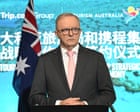
In the ever-evolving landscape of global diplomacy and international relations, nations are increasingly opting for strategic restraint and dialogue to address complex challenges. Recently, this has been exemplified by Australia and France as they navigate delicate geopolitical situations in their respective regions. These developments underscore a calm and thoughtful approach to international diplomacy.
Australia, a key participant in the Aukus alliance alongside the United States and the United Kingdom, has reiterated its commitment to peace and stability in the Indo-Pacific region. The Australian Defence Industry Minister, Pat Conroy, emphasized that Australia will not make any preemptive commitments to participate in a hypothetical conflict involving the US and China over Taiwan. Prime Minister Anthony Albanese supported this stance, highlighting Australia’s desire for peace and security, rather than unilateral actions toward Taiwan. This thoughtful resistance arises amidst reports that Washington is seeking assurances from Canberra regarding its potential responses in the event of a conflict in the region. The notion of “strategic ambiguity” echoes in the US’s own undecided posture concerning military responses over Taiwan, striving to maintain balance without escalating tensions.
Meanwhile, shifting the focus to the Middle East, France shows restraint in the face of a sensitive diplomatic mission. The United Nations has rescheduled a summit aimed at discussing a two-state solution for Palestine and Israel, following delays caused by recent tensions. However, French President Emmanuel Macron is not expected to attend the summit, signaling a cautious approach towards achieving consensus and tangible progress. Macron’s absence might result in a subdued outcome from the summit, particularly concerning new recognitions of a Palestinian state. Despite this, President Macron has been an advocate for the two-state solution, asserting that it is pivotal for peace and stability within the entire region. The complexities of the situation, compounded by stagnant ceasefire negotiations between Hamas and Israel, require a delicate balance of diplomacy.
The approaches taken by Australia and France reflect a global mood of prudence in international relations. Australia demonstrates its commitment to peace in the Indo-Pacific by carefully evaluating its alliances and actions, underscoring the principle that stability is preferred over conflict. Concurrently, France’s role in advocating for a peaceful resolution in the Middle East highlights the challenge of diplomatic patience required to manage longstanding international disputes.
These efforts by Australia and France serve as reminders that diplomatic navigation is often a journey of patience, focus, and clarity. When confronted with potential conflicts, these nations are exemplifying mindfulness by weighing actions and contributing to a more stable and peaceful global environment. Their example illustrates how careful and deliberate diplomacy can pave the way for understanding and peace, respecting the complex dynamics and the diverse interests of all parties involved.
Source: {link}
